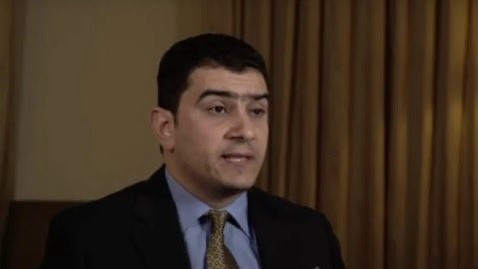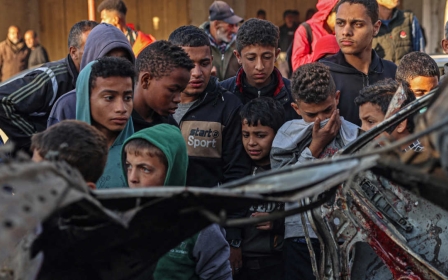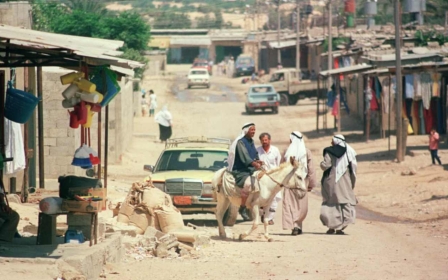Egypt: Rights group director faces ‘smear campaign’ after breaking story on Sinai buffer zone

Egyptian human rights defender Ahmed Salem has been subjected to "a dangerous smear campaign" after revealing that Egypt is preparing an area in Sinai to receive Palestinian refugees fleeing the war on Gaza, a UN expert said on Thursday.
Salem is the director of the London-based Sinai Foundation for Human Rights, which has local monitors in Sinai and near the northeastern Egyptian borders with Gaza and Israel, an area journalists and civil society groups are barred from accessing.
Last week, the Sinai Foundation published exclusive footage showing bulldozers clearing debris and building a concrete wall along the border with Israel, south of the Rafah border crossing.
Contractors working on the project told the independent rights group that work is being carried out under the supervision of the Armed Forces Engineering Authority, to prepare an area to receive displaced Palestinians as Israel threatens to launch a full-scale offensive on Rafah on the Gaza side of the border.
An Egyptian military source confirmed the Sinai Foundation's report in statements to MEE, but denied that Egypt would accept a "mass influx of Palestinians".
Stay informed with MEE's newsletters
Sign up to get the latest alerts, insights and analysis, starting with Turkey Unpacked
In the absence of a clear government position or response to the report, Egyptian state-aligned media outlets dedicated significant airtime to attacks on the NGO and its director, accusing him of spreading misinformation and alleging he has links to terror organisations.
'The government should be aware that this approach has not and will not succeed in silencing the voice of truth'
- Ahmed Salem, SFHR
"They unleashed their TV channels, newspapers and social media mouthpieces in this smear campaign against me," Salem told MEE.
"The attacks are due to our professional work on human rights in an area considered by the Egyptian government as a closed security zone, where any independent research and reporting is prohibited."
Mary Lawlor, the UN special rapporteur for human rights defenders, denounced the campaign as "dangerous".
"Hearing disturbing news that Egyptian human rights defender Ahmed Salem, with the Sinai Foundation for Human Rights, is facing a dangerous smear campaign linking him to terrorist organisations in relation to his peaceful work," she wrote on X, formerly known as Twitter. "I urge the Egyptian government to ensure his and his family’s safety."
The editor of the independent Egyptian news website Mada Masr, Lina Attalah, has been prosecuted and charged with publishing "false news" over a report in October on the potential displacement of Palestinians in Egypt's Sinai.
She was summoned for interrogation only days after another investigative report by the website revealed how intelligence-linked companies and an influential Sinai businessman are profiteering from the siege on Gaza.
"The attacks on the Sinai Foundation and Mada Masr are part of a government strategy in dealing with any outlet that tries to cover the Sinai region independently and professionally," Salem said.
Many human rights defenders and independent journalists have been detained over the past 10 years in connection with their work, Salem added.
"The government should be aware that this approach has not and will not succeed in silencing the voice of truth," he said.
Getting ready for 'the worst'
An Egyptian military source told Middle East Eye last week that the construction of a wall south of Rafah is "to create a centralised area to limit infiltration of militants into Sinai and prepare for the worst."
The source noted that such a scheme is not new, as the area had already been declared a buffer zone following Egypt's 2014 war against militant groups in north Sinai.

"What is new is securing it with higher walls and installing well-guarded gates for entry and exit," he said.
"There is a difference between accepting the displacement and getting ready in case the worst happens."
Egypt’s Foreign Minister Sameh Shoukry also said that his government has no intention of receiving Palestinian refugees, but did not deny the existence of a contingency plan to receive them.
"It is not our intention to provide any safe areas or facilities, but necessarily if this was the case we will deal with the humanity that is necessary," Shoukry said at the Munich Security Conference.
Following the Sinai Foundation’s report, several international media outlets reported that Egyptian authorities are building a walled area to prepare for a possible influx of Palestinians. Satellite images also showed the construction of a concrete wall along the border.
The Wall Street Journal reported that authorities are building an 8 sqm "walled enclosure" to accommodate up to 100,000 Palestinians.
Middle East Eye delivers independent and unrivalled coverage and analysis of the Middle East, North Africa and beyond. To learn more about republishing this content and the associated fees, please fill out this form. More about MEE can be found here.




